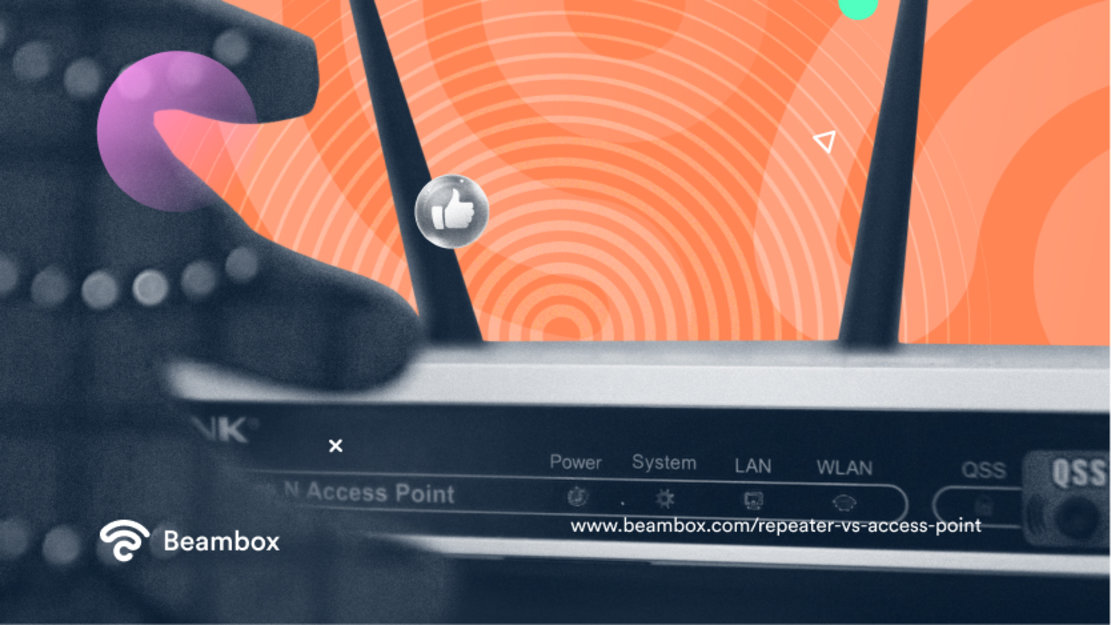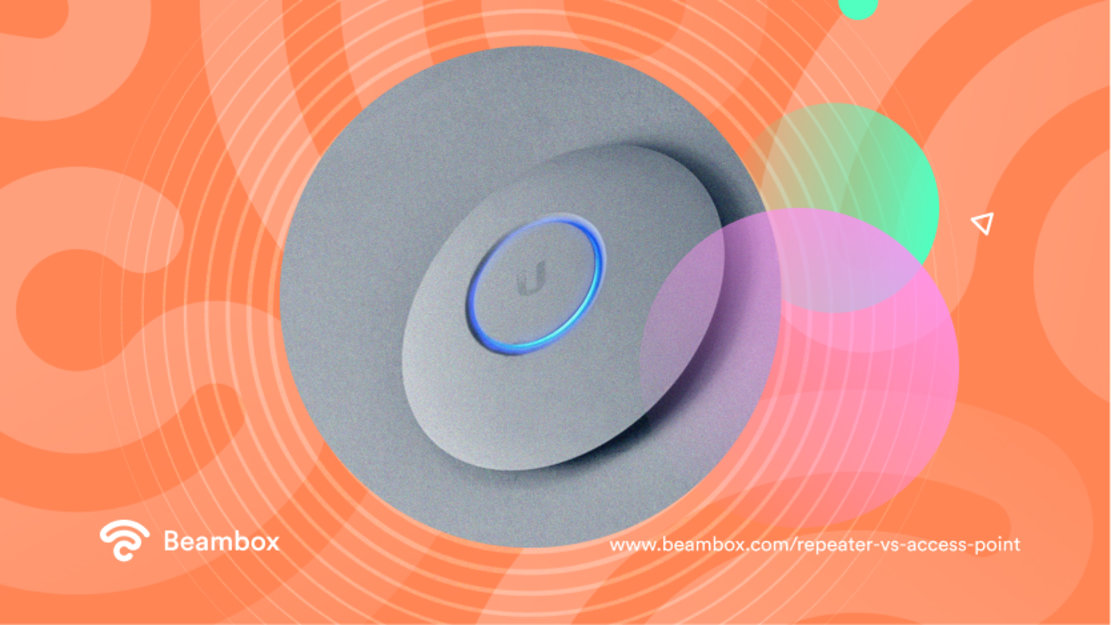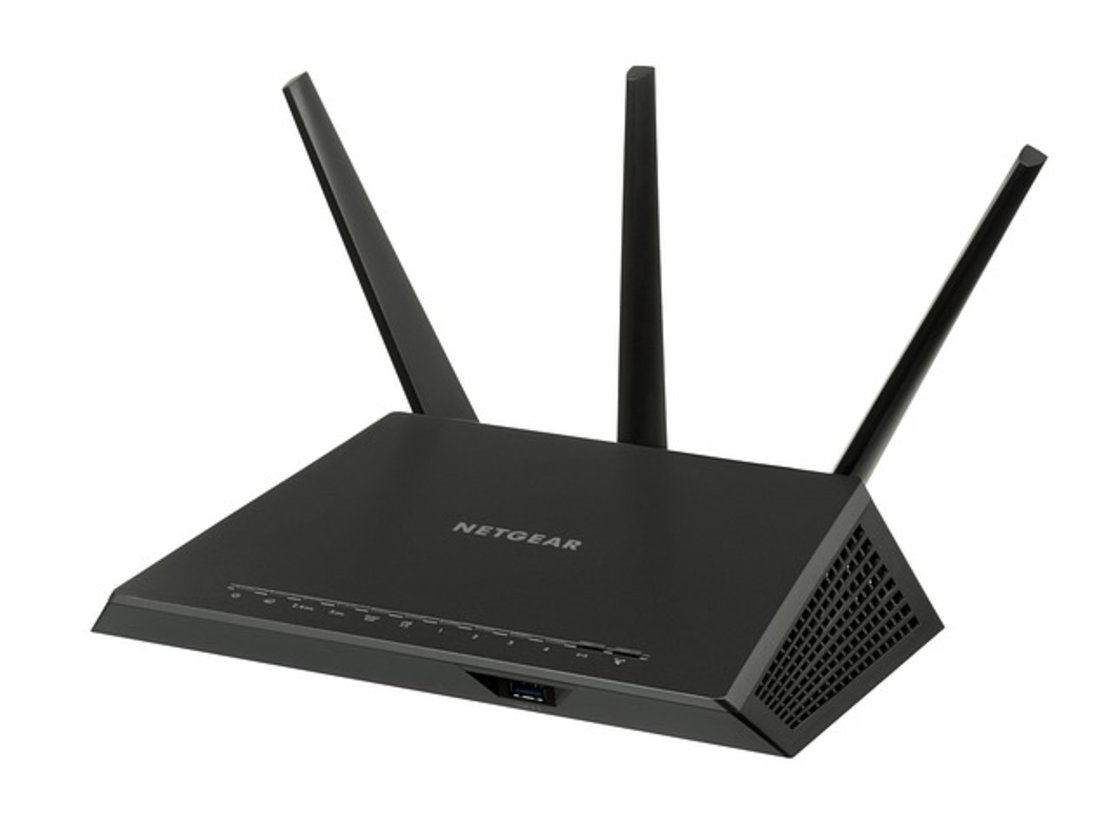Access Point vs Repeater: The Best Pick for Your Business
This access point vs. repeater guide explains everything you need to know about these two tools. Additionally, we’ll let you know how they can help you boost your WiFi reach and stability.
In short, an access point is the better option if you require a dependable internet connection for a medium-sized business space. It’s also a better choice if you host larger groups of people. However, a repeater could be a better alternative for a small venue.
When it comes to repeater vs access point (AP), the primary function is to increase the range of the router’s WiFi. However, the ideal user is quite different.
There are a few things to consider before choosing between the two. Primarily their installation methods, how they affect the overall internet speed, and how many users they can manage simultaneously. Therefore, if your WiFi connection is weak and you want to find the right solution for your situation, keep reading.

Repeater vs Access Point: Which Is Best?
The best option between a repeater and an access point truly depends on the needs of your business. Are you looking to extend your guest’s WiFi coverage? If so, a wireless access point is the most reliable source of internet for your employees and clients. They can also handle more devices.
A repeater is a good option if you’re running a small business with few people using the internet. You might just need to boost the signal slightly to get coverage over the entire office or workspace.
The downside of access points is the installation process. Setting up cables and pulling them through walls and ceilings is not always an option.
The downside of a repeater is that while you get wider coverage, it tends to come at the cost of internet speed. This may be fine, depending on what you do. But if a high-speed internet connection is vital to your business, the access point may be the best solution.
When deciding whether to use a repeater vs access point, you must consider how many devices each option can handle. The repeater is limited to what the router can accept and still be fast enough for utility. This may be fine in your home but can quickly become unstable at your business venue. Especially if you have clients connecting to your social WiFi hotspot.
We’ll go through this question in greater detail. We’ll start by analyzing what is an access point, what a repeater is, and when one might be a better option.

Wireless Access Point vs Repeater: What Is an Access Point?
An access point is a device you connect to the router. However, you must pay attention to where you place it to have the best performance. Generally, you have to set it where the router’s signal cannot reach.
An access point is essentially an extension of the router itself. When you install an access point in an area, all devices will connect through that access point, not the router.
When contemplating wireless access point vs repeater, one of the main issues brought up with access points is the installation process. It needs to connect to the router using an ethernet cable. If it goes to a different floor, you must also pull the cable there. This is a big job for smaller businesses and might not be the most efficient way to solve the problem.
Wouldn’t having a router on each floor be easier than access points?
Do Several Routers Work Instead?
You want access points instead of several routers because they connect to the router and the same local network.
For management and maintenance reasons, it makes more sense for the entire venue to use one local network using a router rather than several.
Skipping updates to your router’s software can cause security and maintenance issues. Therefore, it’s wise to update your devices regularly to stay up to date. Older routers also need replacement from time to time to ensure the highest internet quality. Replacing one singular router is both easier and cheaper.
Does the Access Point (AP) Replace the Router?
No, the AP does not replace the router. The router is still required to access the internet.
Before you install access points, however, make sure you only need wireless internet in that location. When discussing repeater vs access point, you need to know that you cannot connect an ethernet cable to an AP from another device, like a desktop computer. If you need devices connected to the router for maximum performance, AP may not your best option.

WiFi Repeater vs Access Point: Is It Simple To Install Access Points?
As mentioned above, installing access points can be tricky if the work area is big enough. Pulling cables through walls and ceilings is not something everybody can afford. With that said, there are other ways to solve the problem of poor internet connection without access points.
One alternative to them is WiFi extenders. This is a potential solution for smaller businesses with fewer employees and customers still needing to expand their WiFi range. Understanding how WiFi extenders work can help improve your internet connectivity by extending the range of your existing wireless network. For example, a WiFi extender for a hotel ensures guests enjoy strong, reliable internet access in every room, enhancing their overall experience and satisfaction.
AP vs Extender: Are There Alternative to Access Points?
A way to increase the range of your WiFi is by using extenders. One type of WiFi extender is the repeater. Are you wondering what will work best for you? Consider the size of the office and how many floors or buildings need to be covered.
If you’re wondering, “How far does WiFi reach?” the answer depends on factors like the router type, interference, and obstacles in the area. For example, a café that only wants the WiFi to extend to the outside seating area can use a repeater. The repeater helps to boost the existing signal.
Note that a hidden network WiFi can improve privacy, and pairing it with a WiFi extender ensures strong, secure signals throughout your home or office.
You don’t need access points for these, just a WiFi signal extension. This is a good option. But it does come with some drawbacks, which we will cover below. But first, we’ll discuss the repeater and how it works.

Access Point vs Repeater: What Is a Repeater?
In this WiFi repeater vs access point discussion, it’s time to turn our attention to the repeater. The repeater is a device that will wirelessly boost your WiFi signal.
The repeater receives the signal from the router and “repeats” it, thus creating an increased version of the WiFi signal.
For the best experience using a repeater, you must have some distance between the router and the repeater. However, you should locate it in a place where the device can receive a decent signal. Otherwise, it will repeat a weak signal.
If neither the repeater nor the access point seems right for you, there is a third way for your business to get better WiFi: The Bridge.
What Is the Difference Between a Bridge and a Repeater?
The bridge system is a way of connecting two routers to one local network. Two adjacent buildings belonging to the same business can enjoy the same WiFfi and local network. All you have to do is “bridge” the two routers together wirelessly.
The difference between a bridge and a repeater is that the bridge connects two separate networks. This bridging allows them to work as one. The bridge is for when the repeater isn’t enough or it’s not feasible to create access points.
AP Mode vs Repeater Mode: How To Connect Two Access Points?
If you have two access points, you can connect them rather than connecting both to the router. Many access points integrate AP mode or repeater mode. When using AP mode, you can allow a second access point to communicate with the first access point.
This can expand the WiFi range further and only connect one access point to the router.
Some access points can also enter repeater mode. This makes them extenders and will increase the WiFi range further. Much like a repeater, this can come at the cost of speed and bandwidth. This can be a temporary solution if you don’t want another access point.

When To Choose an Access Point
We’ve covered three options for wireless internet connection: access points, repeaters, and a bridge.
All three options work but have their own time, place, and limitations. Do you have a medium-sized business? If so, installing access points connecting to your router is the best option and gives you the best performance.
Using a cable from the access point to the router makes it tricky - and more expensive.
Access points are a long-term solution, not a temporary fix. With this information in mind, consider your venue and your resources and make a decision that best suits your needs. When in doubt, consulting with an expert is always a good idea. Or opt to ask for information from your Internet provider. Now, let’s look at when to choose a repeater instead of an access point.

Access Point vs Repeater: When To Choose a Repeater
A repeater is a good option when you only need to boost the signal a little. Neither AP nor repeater might work if you want the same network in different buildings. Learn how to extend WiFi to another building by using range extenders, mesh systems, or ethernet cables for seamless connectivity across multiple locations.
In those cases, you can explore the bridge option. The bridge allows separate networks to communicate and work as one over a wireless connection.
Having two different routers and networks means more maintenance and management. Each router and network need to be updated individually.
If the repeater isn’t enough, and you don’t need access points, you can connect two networks using the bridge.
Access point vs repeater is an interesting discussion. The best solution depends on specific circumstances. Both offer solutions to poor internet access. The repeater may be a temporary solution, while an access point is a long-term option.
Applying the solutions mentioned in this article will make your internet signal more robust and reliable. Moreover, you can take advantage of your free WiFi and use it to automate marketing initiatives.
Have a look at Beambox. Beambox is a WiFi marketing solution that helps small and medium businesses unleash the power of their free WiFi.
With Beambox, you can brand the WiFi experience at your venue, collect customer data and run marketing campaigns on autopilot.
Over 12,000 businesses are using Beambox to grow their rating on online review sites and grow their business. The best part? Beambox does not require any extra hardware. Give it a try; start your free trial today!
Get Started With Free WiFi Marketing
Beambox helps businesses like yours grow with data capture, marketing automation and reputation management.
Sign up for 30 days free


